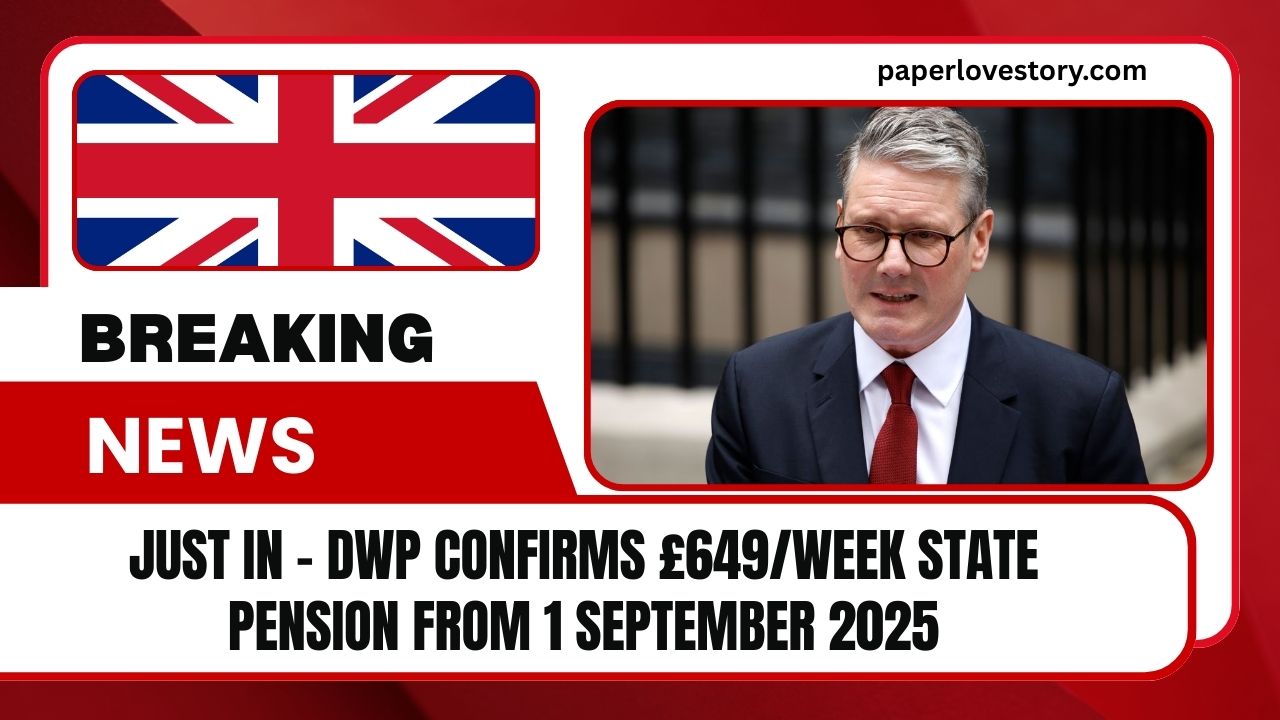The Department for Work and Pensions (DWP) has announced a groundbreaking rise in the UK State Pension, with eligible seniors set to receive up to £649 per week starting 1 September 2025.
This increase represents one of the largest pension boosts in decades and is designed to help older citizens face the ongoing cost-of-living pressures.
What Is Changing From September 2025?
From 1 September 2025, pensioners who meet the qualifying conditions will automatically see their weekly state pension increase to £649.
This change is part of the government’s effort to ensure financial stability for retirees, particularly in light of high inflation and energy prices.
The increase is directly tied to the triple lock guarantee, which ensures that the pension rises by whichever is highest:
- Inflation rate
- Average earnings growth
- A minimum of 2.5%
In 2025, both earnings growth and inflationary pressures contributed to this record-setting uplift.
Eligibility for the £649/Week State Pension
To receive the new maximum amount, seniors must meet certain requirements:
- Be aged 60 or above by 1 September 2025.
- Have at least 35 qualifying years of National Insurance (NI) contributions.
- Pensioners with fewer years may receive a reduced amount but can make voluntary NI contributions to fill gaps.
- Must be living in the UK, or in a country where UK state pension rules apply.
State Pension Payment Details
| Criteria | Details |
|---|---|
| Weekly Pension Amount | £649 (maximum full entitlement) |
| Implementation Date | 1 September 2025 |
| Eligibility Age | 60+ |
| National Insurance Years Required | 35+ for full pension |
| Payment Method | Direct bank transfer (weekly) |
| Additional Support | Pension Credit, Winter Fuel Payment |
Payments will be made directly into bank accounts weekly, with eligible seniors also able to access extra benefits depending on income.
How to Claim the £649/Week Pension
- Existing pensioners: No action needed. The increase will apply automatically from 1 September 2025.
- New applicants: Must apply via the DWP portal or by phone and provide:
- A valid National Insurance number
- Proof of age and residency
- A registered bank account for payments
Expats living abroad should check with the International Pension Centre to confirm eligibility under reciprocal agreements.
Why This Increase Matters
The new pension rate of £649 per week equals over £33,700 per year, significantly easing financial burdens for retirees. It helps cover:
- Rising energy bills
- Increased food prices
- Healthcare and daily living costs
The DWP believes this rise will secure greater financial independence and quality of life for millions of UK pensioners.
Additional Benefits for Seniors
Alongside the pension increase, eligible retirees may also qualify for:
- Pension Credit for low-income seniors
- Winter Fuel Payments to cover heating costs
- Free bus passes and discounted travel
- TV licence concessions in some regions
- Housing benefit and council tax reductions
Together, these benefits can provide substantial support on top of the £649 weekly pension.
Possible Future Reforms
While this boost is historic, discussions continue about the state pension age and long-term funding sustainability. Experts warn that without reform, younger workers may need to contribute more to maintain pension growth.
From 1 September 2025, the DWP’s new £649 weekly State Pension will provide a record-level boost for seniors aged 60 and above.
With living costs still rising, this change offers retirees much-needed stability and improved financial security. Eligible pensioners should ensure their National Insurance contributions are up to date and claim additional benefits to maximise support.
FAQs
When will the new £649 weekly pension start?
The increase takes effect from 1 September 2025 and will apply automatically to all eligible seniors.
Who qualifies for the full £649 per week?
Seniors aged 60+ with at least 35 years of National Insurance contributions will qualify for the maximum amount.
Can UK pensioners living abroad receive the new rate?
Yes, but only if they live in countries with a reciprocal pension agreement. Others may see payments remain frozen.
